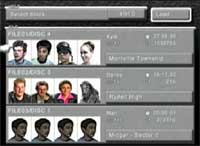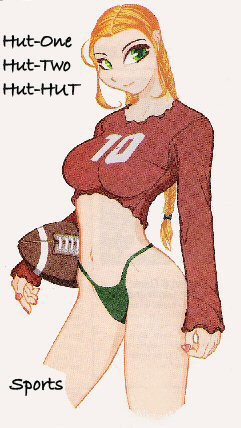First off, I’d like to give a fangirl squee to Feministe’s newest blogger, piny. I have loved piny ever since I came across him in comments on Alas and Feministe, and I considered asking him to blog here more than once (if I had gotten to know him better, I may have snapped him up before Feministe did). I still may see if I can convince him to guest blog on occasion. So, from one of your fans, congrats on the new position, piny!
Today I found an article where he fisks a transphobic letter to the editor from a San Fran magazine. He said to read the article, so I did. Then I read the letter responding to it. Between my hacking and sputtering, I found myself making connections between one issue addressed in the article and the subtext of the letter: the link between transphobia and sexism.
I. What’s the connection?
Marcus Arana, a discrimination investigator with San Francisco’s Human Rights Commission, said he finds many assumptions about transgenders to be based in sexism, regardless of whether those assumptions are coming from men or women.
“There is this funny idea that an FTM is somehow a frog to a butch lesbian pollywog. But we hardly ever hear that an MTF is on ‘the gay male spectrum.’ Once she cuts off her penis she is considered a woman,” said Arana, who agreed that transmale exclusion is “an anomaly in the inclusive San Francisco leather community.”
In a culture where men are Normal and women are Other, it seems obvious that issues that interact with an idea of gender caste will, on some level, include sexism. An unwillingness to look beyond the essentialist view of gender = sex one was born as, I think, is inseperable from the traditions that enforce rigid gender roles.
They are both part of the same continuum: men are men, women are women. Men are the masters, the public half, the strong, smart, and the rational. Women are the servants, the private half, the weak, the childlike, and the emotional. A union is one man, one woman. Any deviation from this norm is an abberation in need of being stamped out.
So, it would make sense for someone who fights one of these rigid roles to fight them all, right? Unfortunately not. Sometimes we can’t see the forest for the trees. Just as feminism is often seen as by and for middle-class white women (says the upper-class white woman), so too do other groups have the potential to hyper-focus on one issue while ignoring an other. In the case of this article, it is the gay leather scene (combining two non-normative practices: homosexuality and BDSM) that is in danger of adopting the same exclusionary tactics as are used on them. What about? The presence of a natural penis. Men need to be men, you see, and it’s only discrimination if that conception of manliness includes fucking women and only women.
II. Sexism: I don’t think it means what you think it means
The article in question is a well written plea for the San Fransico scenes to remain/become inclusionary. It shows the better side of the gay male kink scene, I think. But, as a wise blogger once said, “People who are not the problem…are not the problem.” So, let’s look at a person who is the problem.
Enter Mr. Anderson, a transphobic, misogynistic, possibly bi-phobic, gay male from California. He wrote that letter that had me sputtering. On the surface, what Mr. Anderson is asking for is reasonable: to be able to say “thanks, but no thanks” to romantic/sexual relationships with transmen without facing ridicule. No one sane would argue with that (we all get to define what kind of people we want to let into our pants… I mean lives), but that’s just it. If his argument has any merit, he does his darndest to destroy it with his evidence.
Exhibit A:
I once had an insulting encounter with a transgender pretending to be a man. I did not go psycho – I just got dressed and left. But get it clear: This was a sexual assault.
So, the whole “pretending to be a man” lets us know right off the bat that Mr. Anderson is, indeed, transphobic. Can someone answer me why a woman would “pretend” to be a man, just to get into bed with a gay man? Because, really, I don’t see the appeal. His non-trans privilege may allow him to pick and choose who is “man” enough for him and who’s just “pretending,” but it is his male privilege that sparked the next bit.
“I did not go psycho,” he said. Let me repeat that. I did not go psycho. As if going psycho would be a natural/acceptable reaction to the situation instead of, you know, actually being sexual assault. Which, it appears, Mr. Anderson doesn’t know the definition of. Doing physical violence to someone in an intimate situation (which is what would have occured if Mr. Anderson had “gone psycho” – does he want a cookie for not being an abuser or something?) definitely counts as “sexual assault.” Not disclosing one’s history prior to sexual intimacy, I’m sorry to say, does not. But, I suppose, Mr. Anderson doesn’t care a whit about the women, and men, who have actually been victims of assault.
Exhibit B:
And I do completely support anyone’s right to alter their appearance in any way, shape, or form – but when you begin to try and force me to have sex with you and you are the wrong gender, that’s way out of line. That is sexism.
Holy co-opting of feminist terminology, Batman! As if his misuse of “sexual assault” hadn’t been misogynist enough, we have not one but two plays for sympathy here by stealing from the language of real victims.
Let’s go backwards on this one, however. “That is sexism,” he says, referring to having sex “forced” on him. Sir, I do not think that the word means what you think it means. Sexism – and we’re talking about the personal kind because, as a man, you have not and will not experience the institutionalized kind – is discrimination based on gender. Unless you’re trying to make a (rather silly) case that homosexuality or heterosexuality are sexism because they discriminate against one gender in terms of having sex, you are using the wrong word. The word for forcing sex on someone against their will is “rape.” By misusing the word “sexism,” and indeed claiming something akin to “reverse sexism” – although in this case it’s more “sexism” = “reverse transphobia” – you are using your male privilege to cheapen a very real, and very harmful phenomenon. In fact, one might even say (corectly), that such a assertion is, in itself, sexist!
Speaking of rape and cheapening harmful phenomenons, Mr. Anderson’s claim that, “when you begin to try and force me to have sex with you and you are the wrong gender, that’s way out of line,” is sexist in two ways. 1) He is dismissing and deriding actual cases of rape, and near rape, by claiming that a sexual encounter that he calmly declined and then walked away from without any problem is tantamount to being “forced” to have sex with someone; and 2) He makes the implict connection between rape and “being the wrong gender.” Again, he has the privilege to decide when gender is a dependent factor in deciding whether or not an action qualifies as “sexual assault.”
Exhibit C:
We are unanimous in our being tired of hearing the tranny BS about male genitals and “what a man really is” – that’s such girl talk.
Just in case he hadn’t made the fact that he hates women, and people he percieves as women, clear enough, he turns his attention away from “pretend men” and gives actual women a smack in the face, too. If he thinks discussion of what constitutes a man is too feminine, I would guess this blog is so much “girl talk” that the very thought of it would shrivel up his male genitals. Oh, wait, then he wouldn’t be a real man either. Maybe Mr. Anderson would benefit from a little “girl talk,” it might help him overcome his masculinity issues and realize that accepting transmen as men won’t emasculate him in any way.
Exhibit Stupid:
Basically, what Peter Fiske is asking the community to do is ostracize the men in the leather community that won’t have sex with Fiske or other women who are surgically disguising themselves. In other words, kill the faggots. Imprison the faggots for being “bad.” Make them social outcasts for being sinners against the community.
Witness! The Amazing! Leaps! Of logic!? Inspired by a reason-hating patriarchy! Mr. Anderson goes from accusing Fiske (who preaches inclusion of transmen into men’s spaces, not unwilling men’s backsides) of shaming men who aren’t interested in transmen – excuse me, “women who are surgically disguising themselves,” since, you know, the first thing I think of when I think of plastic surgery is my urge to get a dick so I can have sex with gay men – to… killing faggots.
Wait for it, wait for it…
No. Still don’t get how he got from A to B. Near I can figure, he’s playing the poor whiddle oppressed gay man-born-man who is sooooooooo downtrodden by those transmen because of all the power that vaginas give people in this society. Excuse me if I don’t have sympathy for your plight, Mr. Anderson. I’m too busy dealing with things like domestic violence, grappling with my own privilege, and trying to understand how my oppression intersects with that of others. Others being, you know, groups like transpeople.

 As is traditional with Squaresoft games, continuing a game in Ultimate Utopia will lead you to a character selection screen. The names for the three games are, respectively, Kyle, Danny, and Man. Kyle’s game has the characters we will learn to know and love, while Danny’s game seems to represent Grease (the area is called “Rydell High”), and Man’s game plays on the lack of diversity of Square’s NPCs – as all the characters in it are Man himself.
As is traditional with Squaresoft games, continuing a game in Ultimate Utopia will lead you to a character selection screen. The names for the three games are, respectively, Kyle, Danny, and Man. Kyle’s game has the characters we will learn to know and love, while Danny’s game seems to represent Grease (the area is called “Rydell High”), and Man’s game plays on the lack of diversity of Square’s NPCs – as all the characters in it are Man himself. As this flash movie is as much a parody of Squaresoft as it is a tribute, I was not surprised to find that Megan is the stereotypical magic user. Not just any magic user, however, but the physically weak healer. Her HP is a staggeringly low 191, as compared to the others who have anywhere from 954 to 1023. As the healer, her MP is the highest: 360, as compared to 54 (the highest MP next to hers). Her weapon of choice? The staff. It does 12 damage, yay!
As this flash movie is as much a parody of Squaresoft as it is a tribute, I was not surprised to find that Megan is the stereotypical magic user. Not just any magic user, however, but the physically weak healer. Her HP is a staggeringly low 191, as compared to the others who have anywhere from 954 to 1023. As the healer, her MP is the highest: 360, as compared to 54 (the highest MP next to hers). Her weapon of choice? The staff. It does 12 damage, yay!



